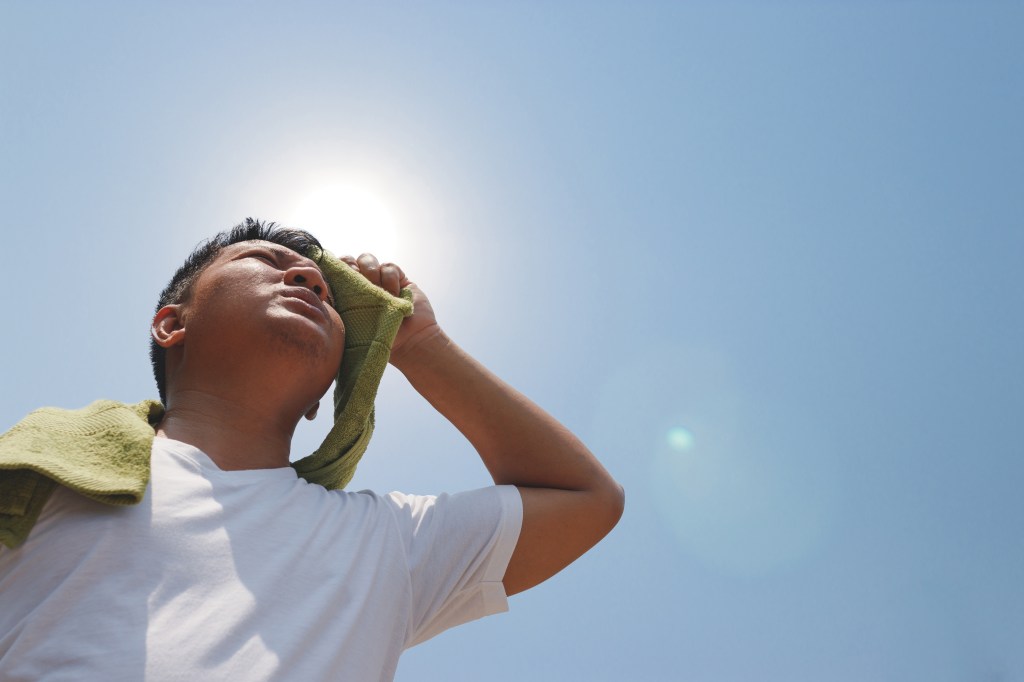Trainer: Heatstroke ‘nothing to play with’ this summer
Published 6:15 am Saturday, June 22, 2019

- heatstroke heat exhaustion stock photo sweat sun summer
Summer is here, and while that can mean trading in coats for swimsuits and indoors for outdoors, it also means an upgrade in the risk for heat exhaustion and heatstroke.
Heat exhaustion is caused by the body overheating and is more likely to happen when the human body is exposed to heat mixed with high humidity and strenuous physical activity. If left untreated, it can lead to heatstroke, the most serious form of heat injury and a possibly fatal one.
The first day of summer saw at least one emergency call related to heat injury, and there were multiple on the final day of spring.
“Dehydration and heatstroke are nothing to play with,” said Chris Collins, head personal trainer at Workout AnyTime in Athens. “… It can hit you and you not even know it’s coming.”
Though his personal training is now primarily indoors, Collins said he’s learned the hard way how important avoiding heat exhaustion can be.
“I had a heat stroke in 2002, and I was out alone,” he said. “There is no playing with that.”
According to the Mayo Clinic, symptoms of heat exhaustion include chills in the heat, dizziness, feeling faint, fatigue, nausea, headache and muscle cramps. Those who continue in the heat can develop an altered mental state, vomiting, flushed skin, weak and rapid pulse, a body temperature of 104 degrees or higher and a stop in sweating — all signs of heatstroke.
“Heat will sneak up on you so fast,” Collins said. “You get dizzy, your face goes to tingling, you feel drained, and you can’t hardly keep yourself standing up right.”
He said being outdoors — whether it’s mowing the lawn, exercising or playing — just isn’t smart when the humidity and temperature are high. Collins suggested scheduling those activities for early morning or late afternoon, when the risk is lower.
“I’m going to mow the lawn today, and I’ve waited all day,” Collins said. “I like push-mowing, but I’m not going to do it in the middle of the day.”
Collins said he sometimes sees people out trying to exercise in the heat, thinking it will help them lose weight, but all they’re really doing is dehydrating themselves and setting their body up to retain water whenever they rehydrate.
He remembered doing two-a-days, or two exercise sessions per day, for high school football. During his senior year, two football players at a neighboring school died from heat complications.
Now, he trains three to four hours a day, but he refuses to do it in the heat.
“When it’s 95, 98 degrees outside, then there’s no point,” Collins said. “You’re doing nothing but hurting yourself.”
However, his personal experience and training have afforded him a few tips in case someone does end up with heat exhaustion.
“Definitely don’t cool down too fast,” he said. “Don’t just get ice water and start drinking it. Drink lukewarm water and cool down slowly.”
Collins encouraged consuming drinks with electrolytes and even a little salt, as well as resting in a cool place, such as an air-conditioned room. The Mayo Clinic further advises seeking medical attention if symptoms of heat exhaustion don’t improve within the hour or the person becomes confused or agitated, loses consciousness or can’t drink.
The advice changes for heatstroke. In that case, the goal is to cool off as quickly as possible by whatever means possible. After calling 911, the Mayo Clinic suggests spraying the person with a garden hose, sponging them with cool water, fanning and misting the person, putting them in a cool tub of water or shower, or placing ice packs or cold, wet towels on the person’s head, neck, armpits and groin.
Weather forecast
The National Weather Service has predicted highs in the lower 90s or upper 80s through Thursday, with chances of rain and thunderstorms ranging from 30% over the weekend to 70% on Monday and back to 30% on Tuesday.
Meanwhile, the level of humidity over the next week could push the heat index values to 101 degrees or higher. When humidity is high, sweat is unable to evaporate as easily, making it harder for one’s body to cool itself.
The Mayo Clinic advises taking precautions to keep cool any time the heat index value is higher than 90 degrees.
Additional risk factors
Simply being exposed to heat for too long can be enough. However, there are other factors that can make a person more likely to experience heat exhaustion or heatstroke, or to experience it sooner than another person.
These include overdressing, drinking alcohol, not drinking enough water, illness, certain medications, obesity, sudden exposure to unfamiliar climates (i.e., traveling south for summer) and being of a particularly young or old age. According to the Mayo Clinic, infants and children under 4 years old do not have a fully developed way of cooling themselves, and older adults may have their ability reduced by illness, medications or other factors.





